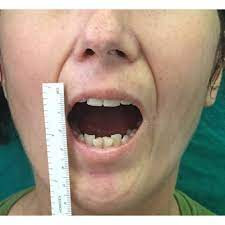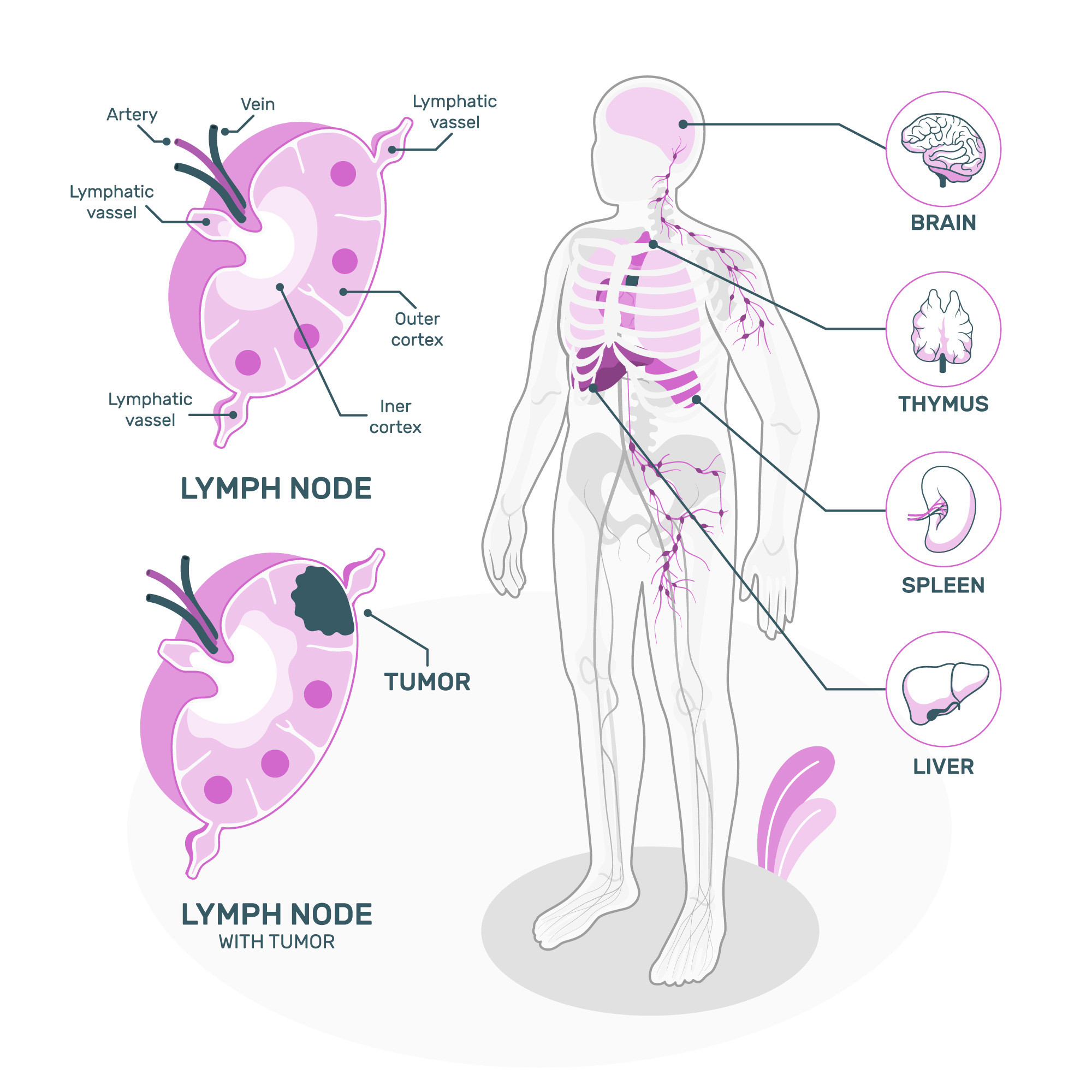Definisi
Kanker pada lidah merupakan salah satu jenis kanker yang dimulai dari mutasi (perubahan) sel lidah kemudian membentuk benjolan pada lidah. Sel lidah memiliki DNA yang mengatur perubahan dan proses kimia yang terjadi pada sel tersebut. Ketika DNA pada sel mengalami mutasi, hal ini dapat menyebabkan sel tumbuh tidak terkendali dan membentuk massa atau benjolan. Diketahui bahwa kanker lidah lebih sering ditemukan pada laki-laki berusia lebih dari 55 tahun dibandingkan pada perempuan atau pada orang berusia kurang dari 55 tahun.
Kanker lidah dapat terjadi pada bagian depan lidah. Hal ini disebut sebagai oral tongue cancer. Selain pada bagian depan lidah, kanker lidah juga dapat muncul pada bagian dasar lidah, dekat dengan bagian melekatnya lidah pada dasar mulut. Kanker jenis ini disebut sebagai oropharyngeal cancer.
Terdapat beberapa jenis kanker lidah. Squamous cell carcinoma merupakan jenis kanker lidah yang paling sering ditemui. Kanker lidah diklasifikasikan dengan menggunakan tahapan dan tingkatan. Tahapan menandakan seberapa jauh kanker menyebar. Tahapan dibagi berdasarkan sistem TNM (Tumor, Node, dan Metastasis).
- Kanker lidah dinilai dari ukuran tumor yang muncul pada lidah. T1 merupakan ukuran tumor kecil dan T4 menandakan ukuran tumor yang lebih besar.
- Neck lymph nodes (Node). Hal ini untuk menilai adanya penyebaran kanker ke kelenjar getah bening. N0 menandakan tidak terdapat penyebaran pada kelenjar getah bening, sedangkan N3 berarti telah terjadi penyebaran yang banyak pada kelejar getah bening.
- Metastasis menandakan penyebaran kanker lidah menuju ke organ tubuh yang lain.
Tingkatan pada kanker menandakan tingkat keagresifan kanker lidah dan kemungkinan kanker lidah untuk menyebar. Tingkatan dibagi menjadi LMH.
- Low (kanker tumbuh dengan lambat dan cenderung tidak menyebar ke organ lain)
- Moderate
- High (cenderung memiliki kemungkinan menyebar yang tinggi dan bersifat agresif)
Penyebab
Infeksi Human Papillomavirus (HPV) dapat menyebabkan kanker pada bagian dasar lidah. HPV dapat menular melalu hubungan seksual. Jika HPV menginfeksi pada daerah tubuh lain seperti genital, dapat menyebabkan terjadinya kanker serviks, kanker penis, dan kanker anal.
Faktor Risiko
Penyebab pasti terjadinya kanker lidah masih belum diketahui. Namun, terdapat beberapa kebiasaan dan kondisi yang dapat meningkatkan risiko Anda mengalami kanker lidah, seperti:
- Berjenis kelamin laki-laki
- Berusia lebih dari 55 tahun
- Merokok atau penggunaan tembakau
- Minum alkohol dalam jumlah banyak
- Menguyah sirih
- Memiliki keluarga dengan riwayat kanker lidah atau jenis kanker mulut lainnya
- Riwayat mengidap kanker, seperti jenis lain dari squamous cell cancers
- Diet yang buruk. Terdapat beberapa bukti bahwa orang yang mengonsumsi sedikit buah dan sayuran meningkatkan risiko terjadinya semua jenis kanker mulut
- Tidak menjaga kebersihan mulut
Gejala
Pada stadium awal, kanker lidah tidak memperlihatkan gejala yang berarti sehingga Anda mungkin tidak menyadarinya. Gejala yang paling dominan ditemukan pada stadium awal kanker lidah berupa munculnya luka pada tenggorokan yang mudah berdarah. Luka tengoorokan ini juga tidak kunjung sembuh sehingga Anda mungkin merasa nyeri pada mulut atau lidah.
Selain itu, terdapat beberapa gejala lain yang muncul pada kanker lidah, yaitu:
- Bercak merah atau putih yang bersifat persisten atau menetap pada lidah
- Munculnya sariawan yang menetap
- Nyeri pasa saat menelan
- Mati rasa pada mulut
- Luka pada tenggorokan yang tidak kunjung hilang
- Perdarahan pada lidah tanpa adanya sebab yang jelas
- Pembengkakan pada lidah yang tidak kunjung hilang atau bersifat menetap
Diagnosis
Anamnesis (Wawancara mendalam)
Untuk mendiagnosis terjadinya kanker lidah, dokter akan melakukan wawancara mendalam dan menanyakan tentang riwayat kanker pada keluarga atau pribadi, apakah Anda merokok, atau minum alkohol dan seberapa banyak Anda merokok atau minum alkohol, serta riwayat Anda terinfeksi virus HPV.
Pemeriksaan Fisik
Pada pemeriksaan fisik, dokter mungkin akan menemukan tanda-tanda kanker seperti bisul yang tidak kunjung sembuh, atau pembearan kelenjar getah bening di sekitar pembengkakan mulut tersebut atau pada leher.
Pemeriksaan Penunjang
Jika dokter melihat adanya tanda-tanda kanker lidah, maka dokter akan melakukan pemerikaan penunjang berupa biopsi. Pemeriksaan biopsi yang paling sering dilakukan pada kasus kanker lidah berupa biopsi insisional. Pada jenis biopsi ini, dokter akan melakukan pembiusan lokal dan mengangkat sebagian kecil jaringan yang dicurigai sebagai kanker.
Selain biopsy insisional, dapat juga dilakukan brush biopsy atau biopsi sikat. Pada biopsi ini, dokter akan menggulung sebuah sikat kecil di atas area yang diduga sebagai kanker. Prosedur ini dilakukan untk mengumpulkan sel yang dicurigai sebagai kanker untuk diperiksa lebih detail. Prosedur ini akan menyebabkan munculnya perdarahan kecil.
Hasil pengambilan jaringan dari kedua jenis biopsi ini akan dikirim ke laboratorium untuk diperiksa. Jika Anda mengidap kanker lidah, dokter akan melakukan pemeriksaan pencitraan dengan CT scan atau MRI guna melihat seberapa jauh dan dalam penyebaran kanker pada tubuh Anda.
Tata laksana
Pengobatan yang dilakukan pada kanker lidah tergantung pada ukuran tumor dan seberapa jauh metastasis atau penyebaran kanker ke organ tubuh lain. Pada kasus stadium awal kanker mulut yang belum bermetastasis, kanker mulut dapat diobati dengan melakukan operasi kecil untuk mengangkat daerah yang terkena.
Pada tumor yang berukuran lebih besar, biasanya perlu dilakukan pengangkatan dengan operasi pembedahan yang lebih besar. Operasi ini disebut sebagai glossektomi parsial. Prosedur ini dilakukan dengan tujuan untuk mengangkat kanker lidah dan meminimalisir kerusakan mulut.
Pada prosedur ini, sebagian lidah Anda yang terkena kanker akan diangkat. Setelah melewati prosedur pengangkatan, akan dilakukan prosedur rekonstruksi (perbaikan) lidah. Dokter akan mengambil jaringan kulit atau jaringan dari bagian tubuh lain yang kemudian akan digunakan untuk membentuk kembali lidah.
Prosedur glossektomi dapat menyebabkan munculnya efek samping yang parah, termasuk perubahan cara bernapas, menelan, berbicara, dan makan. Setelah dilakukan prosedur glossektomi dan pembedahan, disarankan untuk dilakukan terapi wicara untuk membantu Anda belajar menyesuaikan diri dengan perubahan tersebut.
Jika kanker lidah sudah bermetastasis ke kelenjar getah bening, akan dilakukan pengangkatan dengan operasi. Jika tumor berukuran besar atau tumor telah bermetastasis ke organ lain, dokter akan memberikan tata laksana kombinasi berupa operasi pembedahan untuk mengangkat tumor dan radiasi untuk membunuh sel kanker. Tindakan ini dapat menyebabkan efek samping berupa mulut kering dan perubahan rasa pada pengecapan lidah.
Dokter juga dapat menyarankan terapi kemoterapi untuk mengobati kanker yang dikombinasikan dengan prosedur operasi pembedahan dan/atau radiasi.
Komplikasi
Kanker lidah dapat menyebar atau bermetastasis ke organ lain, termasuk ke kepala dan leher. Jika kanker lidah tidak mendapatkan pengobatan segera dapat menyebabkan:
- Kesulitan untuk makan dan menelan
- Kesulitan berbicara
- Depresi
- Dehidrasi (kekurangan cairan)
- Kekurangan gizi
- Perdarahan dan nyeri pada lidah
Pencegahan
Anda dapat mengurangi risiko terjadinya kanker lidah dengan cara merawat mulut Anda dan menjaga pola hidup tetap sehat. Beberapa hal yang dapat dilakukan untuk mencegah terjadinya kanker lidah berupa:
- Tidak merokok
- Tidak mengunyah tembakau atau menguyah sirih
- Batasi konsumsi alkohol
- Lakukan vaksinasi HPV
- Lakukan hubungan seks yang aman
- Konsumsi banyak sayur dan buah
- Perhatikan kesehatan mulut dengan menyikat gigi teratur
- Kontrol kesehatan mulut setiap enam bulan sekali jika memungkinkan
Kapan Harus Ke Dokter ?
Lakukan pemeriksaan rutin jika Anda memilki risiko kanker lidah atau jika Anda merasakan adanya gejala-gejala yang telah dijelaskan di atas, segera lakukan pemeriksaan ke dokter. Penanganan dini pada kanker lidah dapat memperbaiki kualitas hidup dan mencegah terjadinya komplikasi yang serius.
- dr Nadia Opmalina
Healthline [Internet]. Hersh, Erica.. [updated 2019 March 29]. Everything You Need To Kow About Tongue Cancer. Available from: https://www.healthline.com/health/oral-cancer/tongue-cancer
Webmd [Internet]. [updated 2020 September 22]. Toongue Cancers: Causes, Diagnose, and Treatment. Available from: https://www.webmd.com/cancer/tongue-cancer-facts
Gonzalez M, Riera March A. Tongue Cancer. [Updated 2021 Dec 27]. In: StatPearls [Internet]. Treasure Island (FL): StatPearls Publishing; 2022 Jan-. Available from: https://www.ncbi.nlm.nih.gov/books/NBK562324/












